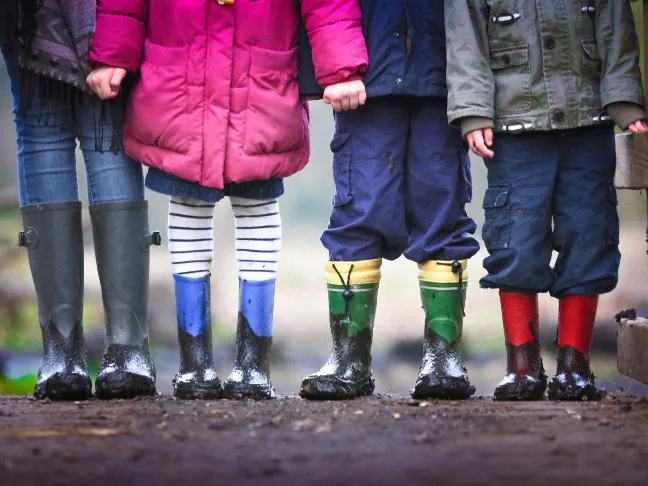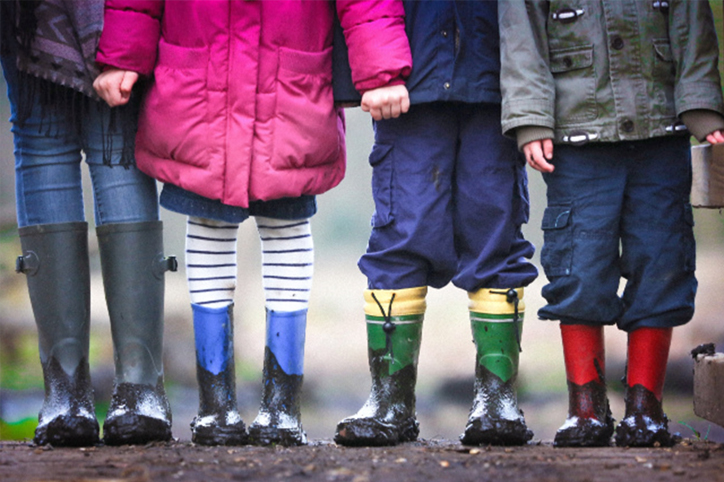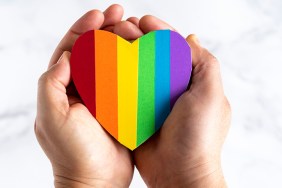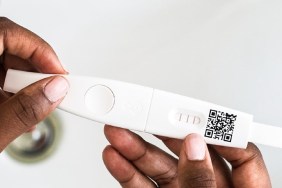
Today I have a very simple ask: Teach your sons about periods, vaginas, and how all the female bits and pieces function. Teach your daughters about penises, testicles, and how it all works. Teach all the genders in your home everything about human sex organs, their proper names, and the nuances around them in a factual, equal manner, and don’t keep those lessons gender-based by parent, either (ie, let Dad talk about periods, too). We’ve gone far too long with this ridiculous practice of keeping what happens in other peoples’ pants a mystery. It’s nonsensical and problematic, and it’s up to us, as parents, to put an end to it.
Separating genders when dispelling information about what is going on with their bodies, or completely eliminating facts about the genders your child is not, sends a variety of messages to both the kids you are talking to and the ones you aren’t. On the flip side, normalizing the education of and conversations about everyone’s bodily functions throughout the genders drops the veil of ignorance that often becomes an excuse for a variety of problems, like:
SHAME
It’s easy to believe that if your gender needs to be shuffled away to your own room to learn about what happens with your body, your pads or tampons need to be hidden away so no one sees them, and you’re encouraged to say to you need to use the bathroom to pee rather than go change your tampon so others don’t get so grossed out by the image and that being a female with a period is a thing to feel shame about. That shame can grow from just periods to being female to being yourself, overall. (Not to mention how some adult males still won’t buy period supplies for the menstruating people in their lives because they grew up believing the products are a thing men should never be associated with. This does nothing to help fight shame or increase gender equality.)
LACK OF EMPATHY
Kids not understanding what’s really going on with people who aren’t their gender can make them feel stupid, and feeling stupid is a big trigger for aggression. Often that aggression reveals itself in the form of making fun of that other person. This lack of empathy through understanding can motivate already emotionally amped-up pubescent kids to make evidence of their differences the butt of their jokes that draw more attention to someone other than themselves, rather than feel empathy for the person in an uncomfortable position and help them out of it. (Saying, “OMG ew! Look, everyone: Billy’s hiding something in his pants!” to get classmates to look at him, rather than the big zit you woke up with.)
SEXUAL RISKS
More likely than not, all humans will eventually have various forms of sex. Not properly understanding how all anatomies work results in an incomplete sexual education that puts them at a higher risk of getting/transmitting diseases, and/or resulting in pregnancies. Understanding their own bodies, being in the habit of discussing them without fear or shame, and understanding other peoples’ bodies, helps them make educated decisions about what sexual acts they want to do, when, and how to do them both safely and consensually. (It’s tough to talk someone into believing that pulling out is 100% safe, or that blue balls is a real and dangerous thing, if they know the facts ahead of time.)
OTHERING
Creating this Us vs Them mentality from the get-go between genders causes a divide that goes far beyond who uses which restroom while out in public. This divide seems to kick into overdrive right around the age when the girls get pulled aside in school to be told all about menstruation and boys are pulled in the other direction so they are not tainted with this knowledge. Periods become this big thing that keeps them apart, rather than just another chapter in their health books that the kids learn about at the same time because it’s really no big deal.
Approximately half the human population is going to get their period. Approximately another half is going to experience something else. Instead of seeing this as common ground—whoa, we’re all going though big changes at the same time, let’s help each other through this—educators, parents, and the media treat it as a reason to keep the kids apart. Make them feel different from each other. Act as if there are secrets to be kept from one another. Encourage that distance by shoving boys toward “boy stuff” and girls toward “girl stuff” under the guise that they’ll be more comfortable if they do that.
It. Makes. No. SENSE.
I am a sister to men and women, and happen to have a son and a daughter of my own. Mixed-gender households are my status quo, so it was startling to me how many families I met with kids all of one gender who did not know what to think/do about the fact that my kids were equally cool with diving into whatever play was going on with those all-boy or all-girl households. The brothers would not even think my daughter would be interested in or know how to do the games they let my son walk right into. The sisters would behold my son as one would an alien creature, unsure of how to so much as speak with him.
It. Is. So. WEIRD.
Most clothing, toys, games, sports, extracurricular activities, books, TV programs, movies, and other experiences work for any gender. One’s ability to eventually menstruate has no affect on the outcome. I know this because I’ve not only seen this theory in action, but I’ve been living it for over four decades.
I have worn clothing and shoes from both the Men’s and Women’s departments, used restrooms labeled both Men’s and Women’s, grew up hanging out with my youngest brother doing a lot of the same things, and often enjoy entertainments that the media markets toward either men or women. This is my norm, for I have never believed that I can’t or shouldn’t do a particular thing simply because I was a menstruating female.
I’ve raised my son and daughter equally in expectations and education. When I put period supplies under the bathroom counter for guests, I showed both kids at the same time, and made suggestions on ways to tactfully let friends know it’s there for them if they need it. Both the “boy video” and “girl video” from their middle school puberty presentations have been shown to them at home. Everything anyone’s body could go through has been explained and discussed to the crowd at large without hesitation.
None of these things were difficult conversations to have. I’m their mom. I’m the one who has taught them something almost every day of their lives, from how to tie their shoes to how to fight off a sexual assault. Some lessons come up in natural conversations, others are ones I bring up because it’s time.
A fundamental I tend to keep coming back to in my own parenting is that kids should be raised equally in education, experiences, and respect. Actively terminating the practice of keeping boys in the dark about periods is a big part of this, because that seems to be the jumping point for a lot of people to start the big divide between genders. Not only does it create an environment in which all genders receive the same education and experiences, it also helps them respect themselves more and each other. So why aren’t more of us doing it?








